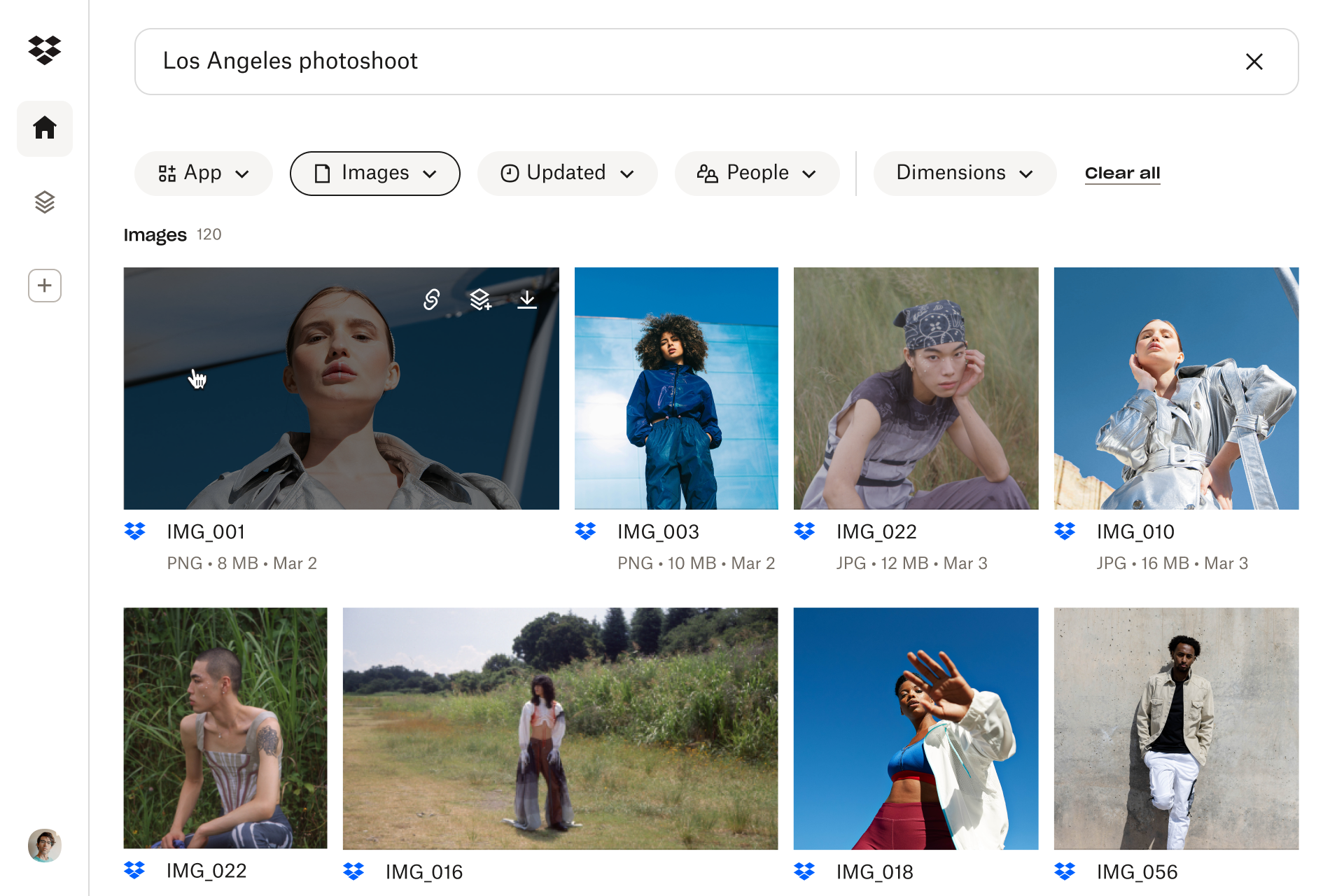
Relevance and accuracy shape how AI search delivers results—but they are not the same thing.
When you type a query into an AI-powered search tool, you expect the best answer to appear instantly. But best can mean different things. An answer might be:
- Accurate—factually correct, but still missing the mark if it isn’t suited to what you actually need in the moment
- Relevant—it sounds right, fits your intent, but falls apart under closer inspection because it isn’t fully accurate
In content-heavy workplaces, that distinction matters. Teams are drowning in information, and AI search engines are only as useful as their ability to balance truth with context. When relevance and accuracy work together, search stops being a guessing game and becomes a real productivity advantage.
Dropbox Dash delivers both by connecting your tools and understanding the context behind your content—not just the keywords. It provides results that are both trustworthy and useful, enabling you to act faster with confidence.
Why relevance and accuracy are often confused
Relevance and accuracy sound similar, but they answer different questions. Relevance asks whether a result is useful—accuracy asks whether it is correct.
You can think of it this way:
- Relevance is about fit—does this answer help you move your work forward?
- Accuracy is about fact—is the information itself true and verifiable?
- Relevance without accuracy—leads to confident mistakes
- Accuracy without relevance—leads to wasted time
Knowing the difference helps teams evaluate AI search tools and trust the results they see. This clarity is essential as search evolves beyond simple keyword matching.

What search relevance really means
Relevance is about usefulness—not just matching words, but understanding what you’re actually trying to accomplish. It measures how well a result aligns with your intent, context, and timing. In other words, it’s less about the file’s title and more about whether it helps you take the next step.
You’ll know search is truly relevant when it can:
- Surface what matters now—not just what exists in your archives
- Understand your context—like pulling a campaign brief when you ask for “last quarter’s results”
- Spot patterns in your work—recognizing related files, threads, or projects without being told
- Anticipate your need—suggesting the right document before you finish typing
In a workplace, that might mean surfacing the latest campaign deck or an internal FAQ that helps you complete a task—even if the file name does not match your keywords exactly.
What search accuracy really means
Accuracy is about truth and trustworthiness. It measures whether the information itself is correct, verified, and up to date. Accuracy ensures that when you make a decision, you’re building on facts.
You’ll know search is truly accurate when it can:
- Validate data sources—pulling from official or approved files, not random duplicates
- Prioritize freshness—showing the latest numbers, not last quarter’s drafts
- Preserve integrity—keeping figures, quotes, and stats exactly as they appear in source materials
- Reveal confidence signals—helping you see why a result is trustworthy
So, an accurate result could contain the right figures but still miss the point if it doesn’t fit your current project. The real magic happens when accuracy meets relevance—when your search delivers answers that are both right and right for you.
Why both matter for workplace search
If search is relevant but inaccurate, teams risk using the wrong data—like referencing an outdated pricing sheet that still looks familiar or citing old metrics in a client presentation.
If it is accurate but irrelevant, time is wasted digging through technically correct but contextually useless results—like pulling last year’s campaign deck when you really need the new version still in review.
The best AI search systems balance both. They recognize intent and verify truth—surfacing the right information at the right time, from the right source.
Universal search in Dash does this, combining contextual understanding with secure, validated data—so your team can move quickly and confidently, without second-guessing every click.

How Dash delivers relevance and accuracy together
Relevance and accuracy don’t have to pull against each other—they can coexist when your tools understand both what you’re looking for and why you need it.
Dropbox Dash delivers a powerful universal search capability, which is built to do both in tandem. It creates an AI search experience that mirrors how teams actually think and work.
Instead of just fetching files, Dash interprets intent, connects context, and validates information before surfacing results. Here’s how it provides an accurate and relevant search experience:
- Contextual understanding: Dash interprets your query based on what you are working on, surfacing files from connected tools and folders. This means it understands what you’ve been working on and what you really need.
- Permissions-aware results: As Dash respects the existing permissions in your connected apps, you only see what you are allowed to see—keeping results secure and reliable. There’s a powerful admin console to manage this too.
- Connected content: Dash pulls from documents, decks, and messages across your workspace to provide the full picture. Any connected apps and data sources you link to your account are easy to securely search.
- Continuous learning: The more you use Dash, the better it understands what matters to you and your team. This makes pulling relevant files and your favorite data sources before you even need them more reliable.
The result is a search experience you can trust—fast, accurate, and grounded in your team’s real context. With Dash, you can find the right information, exactly when you need it.
Discover Dash Universal Search in action
See how Dash surfaces relevant and accurate results from across your tools and files.
Best practices for improving search performance
Even the smartest AI search tools need good habits to perform their best. Clear inputs and consistent structure help tools like Dash understand your intent, surface the right results, and keep your workspace clutter-free.
Think of it as giving your search engine a map—it already knows the terrain, but context helps it find the quickest route. Here’s how to make every search smarter and more reliable:
- Use natural language—write queries the way you would ask a teammate
- Add context—include project names, dates, or file types to narrow results
- Verify versions—confirm you are referencing the most recent file
- Train your tools—label and favorite important items so AI learns your patterns
- Review results regularly—audit for both accuracy and usefulness
Search performance improves with every interaction. When you combine these simple habits with contextual intelligence in Dash, the tools start working with you—so information finds you faster.
Find exactly what matters with Dropbox Dash
Relevance and accuracy need to work together in search. Universal search in Dash blends both, providing teams with results that are contextual and reliable, creating a complete search experience that drives efficiency.
When search feels intuitive, projects move faster, and Dash helps your team spend less time searching. See how Dash helps teams find what matters most and spend more time creating—contact sales or try a demo today.
Frequently asked questions
Relevance measures how well a result matches your intent, while accuracy measures whether the content itself is correct. The best tools balance both. In short, relevance gets you close, accuracy gets you right—and Dash delivers both at once.
Dash uses Dropbox file context and permissions to surface verified, current information so teams can trust every search. It knows not just what to show, but why it’s the right version—so every answer is both trusted and timely.
Yes. As teams use Dash, it learns from activity patterns and feedback to deliver increasingly relevant and precise results. The more you work, the smarter Dash becomes—turning everyday searches into a continuously improving system of insight.
Get started with Dash
.webp)

.svg)


.jpeg)